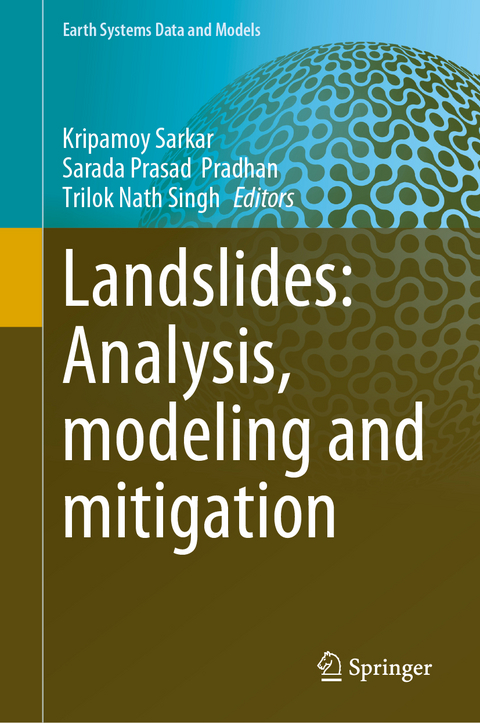
Landslides: Analysis, modeling and mitigation
Springer International Publishing (Verlag)
978-3-031-78895-6 (ISBN)
- Noch nicht erschienen - erscheint am 24.02.2025
- Versandkostenfrei
- Auch auf Rechnung
- Artikel merken
The book aims to enhance understanding of landslides by focusing on detection, prediction, and monitoring. Recently, the number of significant landslides and the damage they cause has increased globally. Landslides are among the most devastating natural hazards, resulting in widespread damage to habitats on local, regional, and global scales. Experts from around the world have shared their experiences in landslide research and practice, which may help stakeholders mitigate and predict these events. The book comprises chapters on
Dynamics, mechanisms, and processes of landslides.
Mapping and assessment of hazard, vulnerability, and risk associated with landslides.
Geological, geotechnical, hydrological, and geophysical modelling for landslides.
Numerical simulation of slope to analyse their stability.
Monitoring and early warning of landslides.
Application of remote sensing and GIS techniques in monitoring and assessment of landslides.
The book is very much helpful for researchers, practitioners, and decision-makers to adapt suitable modern techniques for landslide study.
Kripamoy Sarkar is an Associate Professor in the Department of Applied Geology, Indian Institute of Technology (Indian School of Mines) Dhanbad. He is an accomplished and trained engineering geologist by profession with unique blend of industry and academic experience and has contributed significantly in the field of natural hazard investigations and soft computing applications in landslides. A few noteworthy contributions of Prof. Sarkar include improvements in rock mass characterization systems and application of numerical modelling techniques to solve slope instability problems in the Indian Himalayas. His list of publications includes 85 scientific papers in various national and international journals and conference proceedings of repute. He has also published four edited book chapters that reflect advanced studies on the assessment of the landslide hazards.
Sarada Prasad Pradhan is currently working as an Associate Professor in the Department of Earth Sciences, Indian Institute of Technology (IIT) Roorkee, India. He obtained his M. Sc. (Applied Geology) and Ph.D. from IIT Bombay, India. Dr. Pradhan's research focus lies in geological and geotechnical investigation with a thrust on rock mechanics and engineering geology in understanding and mitigating landslides. He was a recipient of outstanding young faculty award by IIT Roorkee, Melpadom Attumalil Georgekutty Young Scientist Award, Award of excellence from ONGC Ltd and few best paper awards in various conferences. His research findings have been well received by the scientific community and published in leading national and international journals, book chapters, and conference proceedings. He has edited a book entitled "Landslide: Theory, practice and Modelling" published by Springer in 2019, which is well recognized by academia as a reference book in the field of Landslide.
Trilok Nath Singh is the Director of IIT Patna and has previously served as Vice-Chancellor at M.G. Kashi Vidhyapith and V.B.S. University. With over 30 years of post-doctoral research and teaching experience, he specializes in slope stability, rock mechanics, underground design, and mining operations. He has supervised 5 postdocs, 50 PhDs, and published over 400 research papers, garnering more than 18,000 citations. Singh has received numerous awards, including the National Mineral Award and various best paper and teaching awards. He is also involved in multiple editorial boards and scientific societies.
Navigating Hydrological Factors in Understanding and Mitigating Landslide Hazards in the Indian Himalayas a short review.- Geological and microstructural controls on a landslide in Ghat region along NH 09, Kumaun Himalaya.- Rainfall Induced Landslides in Bangapani Tehsil of Pithoragarh District, Kumaun Himalaya, India.- A comparative analysis of landslide characteristics of the Himalayan and Western Ghat mountain belts.- Applications of photogrammetry technique in slope stability investigation.- Empirical method based geotechnical assessment of engineered slopes along national highway 58.- Slope stability evaluation through Slope Mass Rating and its extension.- Assessment of Progressive Behaviour of Deep Seated Kotropi Landslides Himachal Pradesh Using the 3D Limit Equilibrium Method.- Simulating failure modes in a jointed rock slope using distinct element modeling a case study from the Himachal Himalayas of India.- Finite element modeling for rock slope stability assessment in north eastern India.- Effect of ditch design on rockfall hazard using rigid body model.- Probabilistic stability analysis of opencast coal mine dump slopes from Lower Gondwana Region, India A case study.- An emerging machine learning approach for predicting risk and stability on susceptible terrain.- Comparative Assessment of XGBoost model and Hyper parameter Optimization Techniques in Landslide Susceptibility Mapping a Case Study of Aglar Watershed, part of Lesser Himalaya.
| Erscheint lt. Verlag | 24.2.2025 |
|---|---|
| Reihe/Serie | Earth Systems Data and Models |
| Zusatzinfo | Approx. 300 p. 64 illus., 32 illus. in color. |
| Verlagsort | Cham |
| Sprache | englisch |
| Maße | 155 x 235 mm |
| Themenwelt | Naturwissenschaften ► Biologie ► Ökologie / Naturschutz |
| Naturwissenschaften ► Geowissenschaften ► Geologie | |
| Schlagworte | Geological and Geophysical Investigation • Hazard Zonation • Landslide Susceptibility • numerical modeling • Slope Stability |
| ISBN-10 | 3-031-78895-8 / 3031788958 |
| ISBN-13 | 978-3-031-78895-6 / 9783031788956 |
| Zustand | Neuware |
| Haben Sie eine Frage zum Produkt? |
aus dem Bereich


